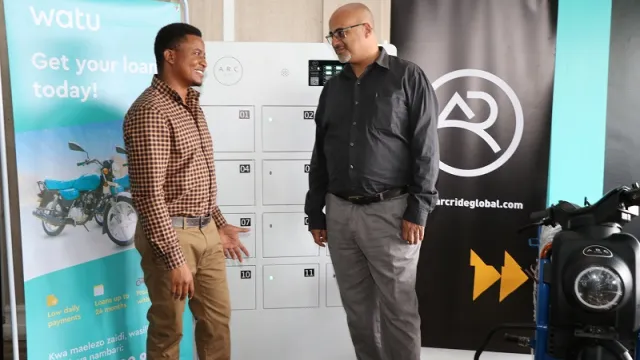Watu rides on trust to keep credit affordable

Watu rides on trust to keep credit affordable
Bodaboda riders who acquired motorcycles through the asset finance company Watu Credit have been spared from the current market uncertainties, where lenders are increasing loan rates to align with the Central Bank of Kenya's signal for expensive credit.
Over the past year, banks have been notifying clients about an increase in loan rates to reflect the cost of funds and a higher risk of default, following the Central Bank of Kenya's decision to raise the Central Bank Rate by 3.75 percentage points to an eleven-year high of 12.5 percent in the last 12 months.
However, for Watu, loan payment rates have remained unchanged, thanks to the asset finance model built on trust, flexibility, and relationships with riders.
Watu’s Kenya Country Manager, Mr. Erick Massawe, mentioned that, in fact, the lender has intensified support for riders to help them navigate the current macroeconomic shocks after the costs of units and fuel shot up.
“Nothing has changed on what we charge. However the bikers have been affected by macroeconomic issues since the units are imported and the shilling has depreciated almost 25 percent hitting asset retail prices and steady increase in price of fuel has put our customers under massive pressures,” Mr Massawe said.
“We have loan officers dedicated to riders offering credit management support to help our customers navigate seasonality and macroeconomic issues and advise them on loan affordability and if need be how to restructure their facilities,” he said.
Riders pay a flat rate
For a long time, Watu's fixed payment model, wherein riders pay a flat rate of Kes300 to Kes400 a day for 12 to 18 months, was perceived as more expensive than bank loan rates.
The company faced challenges in explaining that their rates encompassed various auxiliary support, including a GPRS tracker, safety gear, and comprehensive insurance for the bike.
Watu goes beyond the conventional financing model by extending financial literacy lessons to riders, advising them on loan payments. Moreover, the company has established Watu Shule, Kenya's first pre-financed driving school, which educates riders on traffic laws and facilitates the license application process.
The firm not only finances motorcycle repairs and refurbishments but also assists riders in processing insurance claims when units get stolen, providing replacement bikes during challenging times.
Customers have the option of securing free storage for their bikes and can pause payments during periods of incapacity due to sickness or other reasons, ensuring they only pay when earning an income.
Watu employs a model that relies on trust for its customers. Instead of requiring other assets for collateral, customers only need to provide a guarantor known to Watu with a good track record of repayments to acquire loans. This approach enhances traceability and addresses challenges when customers encounter repayment difficulties.
As the default risk increases on conventional loans, leading to a rise in the cost of bank lending, Watu's social-loans model stands vindicated.
While banks may appear more affordable on the surface, they only finance assets without support structures. Consequently, default risks remain high, and lenders demand collateral if riders struggle to make payments.
Read also: Senate clears Watu Credit of any wrong doing
Riders lacking collateral
“Bankers are asset centric and that is why it costs more for them to factor risk and recoveries, while ours goes beyond that. We are customer centric and we support our riders throughout the journey of acquiring the asset,” Mr Massawe said.
For years, many riders lacking collateral couldn't secure bank loans to purchase their own motorcycles, leading scores to adopt a rental model.
In this arrangement, they would rent a bodaboda from owners for between Kes400 to Kes600 a day, retaining whatever they earned beyond the rental and fuel costs.
Eight years ago, when Andris Kaneps arrived in Mombasa, he had no idea that a conversation with a rider at the bodaboda stage would offer a solution that would make half a million Kenyans owners of their own motorcycles.
Following his trip, where he learned about the renting model, he co-founded Watu Credit, employing the same concept, but this time the prospective customers would own the units after a fixed period.
The model gained significant traction, and in less than a decade, five out of ten motorcycles in Kenya have been financed by Watu.
The business has expanded to seven African countries and is rapidly growing, facilitating the movement of people and goods in rural Africa.
Electric bikes
Watu is also at the center of the clean energy revolution, capitalizing on electric motorbike battery logistics to lower barriers of entry.
Mr. Massawe stated that while riders typically pay between 17 percent to 50 percent of the asset price as a down payment for internal combustion engine (ICE) bikes, for electric bikes, the payment is as low as 8 percent.
He explains that electric bikes are safer against issues such as theft and provide a lower risk for lenders because they are easily traceable compared to ICE bikes.
“The swap model, where riders do not own the battery and have to swap it when depleted, makes it easier to find a bike because they have a known and determined location, making it easier to track them,” he said.
The Kenya Country Manager believes that electric units will gain popularity when the charging infrastructure becomes well-developed and supported by the government and the private sector.
“We need massive capital investment in building infrastructure for charging and swapping stations akin to the network of filling stations, and that is where the government has a role to play to encourage the private sector to set them up,” he said.



